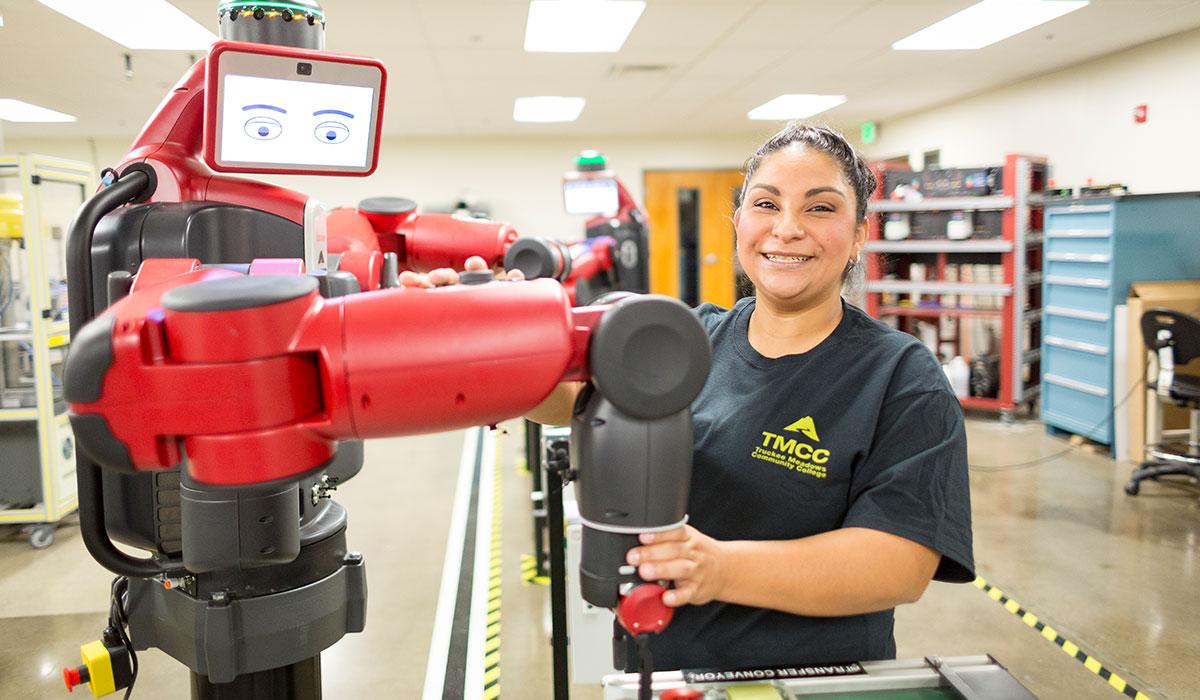
If technology, innovation, and robots are something you’re passionate about, then we have exciting news for you: TMCC’s Production Systems (Advanced Manufacturing and Robotics) is announcing a new Bachelor of Science degree for students seeking a supervisory role in a cyber-manufacturing environment. The degree, which launches this fall, will build upon the skills students learn in the Associate of Applied Science degree, which trains students in the integration, maintenance and operation of advanced robotics, computerized inventory and process control, quality assurance and system management in modern manufacturing facilities. “Students get to learn by utilizing advanced programs and state-of-the-art equipment at the school…[the kind of] equipment that tech companies are using today,” said Shawn Troung-Vu, a graduate of the AAS program. “This program gave me an edge in entry-level positions in my professional life.”
The program is focused on what is known as “Industry 4.0” —our most recent industrial revolution—in which conventional manufacturing machinery is augmented with wireless connectivity, sensors and through advanced technology, the ability to visualize and manipulate the entire production line remotely.
Students who gain admission to the program will work with cutting edge technologies, including Virtual Reality, Augmented Reality, Advanced Robotics, Smart Sensors, Artificial Vision Systems and Automated Guided Vehicles (AGVs).
“This program is designed for working people who are looking to continue their education in this field,” said Randy Walden, who is an instructor in the program. “It is meant for incumbent workers who are looking to advance into a supervisory role.”
The program will offer 3–4 classes per semester that students can take in a recommended sequence. Classes in the program are offered in a hybrid format that will include both online and in-person lab components. Additionally, students will be able to work on teams for the hands-on assessments that occur during the in-person labs. While the classes aren’t “open entry” like other programs at TMCC’s William N. Pennington Applied Technology Center, classes will be scheduled to allow a student to continue their current employment.
Avery Washington, who completed the AAS degree in Cyber-Physical Manufacturing in Spring 2019, said “...The hybrid form of the classes allowed me to further my education while working full-time effortlessly. The online assessments helped me retain the information from the readings and the lab portion allowed me to work hands-on with the material [we] covered.”
Leroy Gomez, who has also completed the AAS degree, enjoyed the hybrid nature of the class. “Working both online and coming into class really helped me get back into school,” he said. “Working over 80 hours a week combined with the flexibility of the class schedule really made it easier than I thought.” Gomez plans on applying for positions in either maintenance or as a technician... “something I never thought I would be doing,” he said.
Interested students will need to apply to the program. Admission requirements include an associate degree in a similar or related field. Applicants with related experience in the field with industry credentials will also be considered. The application process can be completed online.
Students who are considering this field can rest assured that the diverse skills and experiences they will encounter in this program will carry over into their careers. “The program provided me with the fundamental skills necessary for employment in advanced technical roles. The hands-on experience I gained in the labs working with electrical circuits, VFDs, conveyor systems, various sensors, PLCs and FANUC robots were paramount to obtaining that position,” said Washington. TMCC’s BAS program is unique—it’s the only one in the U.S. focused on cyber-physical manufacturing—and exceptionally dynamic because the field is constantly changing due to innovations in technology.
“Manufacturing processes are becoming more and more automated, which means equipment, processes, manufacturing and production systems, and measuring and control equipment and systems must be planned, produced, and optimized to improve quality and product throughput,” said Walden. “This requires comprehensive wide-ranging, hands-on technical expertise. Our lab is equipped with the latest technology and industrial components, giving us the opportunity to provide fundamental and in-depth knowledge of digital, fully-automated production technologies to students and prepare them for the Industry 4.0 jobs of the future.”
For more information about the new BAS in Cyber-Physical Manufacturing, contact the Applied Technologies department at 775-856-5300.






